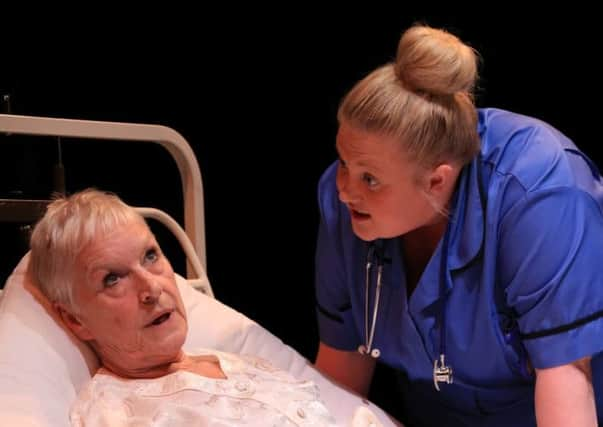Theatre review: Cars and Boys, Dundee Rep


Cars and Boys
Dundee Rep
Star rating: * * * *
You would never guess that death is common, though, from the avalanche of plays being written about it by people born in Britain in the 1950s and 1960s, as they make their way through middle age.
Instead, they stare at it, and the illnesses that often precedes it, with a kind of fascinated horror, as if unable to believe its cruelty and where the idea of death used to act as a catalyst for plays about other themes, from young love to family conflict, it now seems to have become a subject in itself, although perhaps not a very fruitful one.
Advertisement
Hide AdSo Stuart Paterson’s new play for Dundee Rep – the first wholly adult drama in many years, from Scotland’s master of modern Christmas fairytales with a touch of panto – tells the story of the last days of Catherine Miller, a feisty woman of 70 or so, exquisitely played by Ann Louise Ross, who has spent her life running the family haulage firm.
As we learn in the course of the play, she smokes and drinks heavily, revels in her high-stress job, treats her loyal and hardworking husband Duncan with contempt, and heartily despises her successful schoolteacher daughter Margaret. And now, perhaps predictably, she has had a stroke, which has left her largely helpless in a hospital bed.
In Philip Howard’s beautiful and sensitive production, set in a transverse studio space carved out of the Dundee Rep stage, Cars And Boys takes a deep, strong pleasure in its character as a kind of dream play, in which the presence of Catherine’s real-life visitors – Duncan, Margaret and her much-loved grandson Robbie – alternates with visions of past lovers, notably Catherine’s handsome first love, Johnny, and a lorry driver called Davy, who always had eyes for her despite her status as a boss and a married woman.
Lisa Sangster’s set is haunting, a hospital ward that looks like a clearly-marked road, set between dark forests and there is perfect, meditative live cello music from composer and musician Greg Sinclair, as well as a series of beautifully-pitched performances from Howard’s eight-strong ensemble company.
In the end, though, despite the sheer quality of the production, Paterson’s 85-minute play – which is long on monologues, and much more lively in dialogue – perhaps just fails to explain its existence clearly enough. Although it mentions Catherine’s passion for fast cars and “real men”, it’s not about cars and boys; it is about how a feisty woman is forced to let go of life when she is far from ready, her conflicts not at all resolved.
And although that’s how it goes sometimes, in an imperfect world, I’m not sure this play – or any play – can turn that everyday truth into dynamic drama without a stronger focus on the living, and on what this death means, to those who must travel on.
Seen on 15.04.14 • Until 26 April